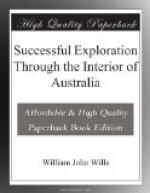The proceedings then closed.
. . .
In his ordinary letters to me, and in his journals of the Expedition, which he knew were likely to become public documents, my son seldom or never touched upon the all-important subject of religion. This has given rise to an opinion broadly hinted in Australia by some, and of course believed by more, that he was either a sceptic or a downright infidel. Nothing could be further from the truth. His mother’s love had instructed him early and zealously in the doctrines of Christianity, and prepared his mind for a conviction of their divine truth when he reached an age which would enable him to exercise his own judgment. As I have already mentioned, even in childhood he had an inquiring mind and a disposition to take nothing for granted without investigation. Hence the questions which sometimes surprised and puzzled his instructress. The tendency grew with his growth, and displayed itself in his mode of dealing with every branch of knowledge comprised in his education. If a new fact in science or an improvement in a mathematical or surgical instrument came under his observation, he closely examined their bearing and use before he adopted them or subscribed to their truth or utility. Those who question before they believe are not unfrequently pronounced unbelievers because they question; an inverted mode of reasoning equally uncharitable and illogical. My son had an undisguised dislike to any ostentatious display of religious sentiment and phraseology, particularly on the part of those who were not teachers by calling. He sometimes suspected more cant than sincerity in the practice, and thought these matters better suited for inward communication between man and his Maker than for public exhibition on common occasions. With my wife’s permission I insert the following letter, now for the first time placed in my hands:—
Flagstaff Observatory, Melbourne, June 17th, 1860.
My dear mother,
The mail arrived here only two or three days ago, being nearly a fortnight behind time. I have received your letter of the 13th of April, and one from Bessy. Your endeavours to show that my remarks on religion were wrong, have tended to convince me more clearly that I was right, and that you, partially at least, misunderstood what I said. I did not charge you with being openly uncharitable or of plainly condemning any one; nor do I blame you for believing you are right. We all think we are right, or we should not believe as we do. But I do blame those who pronounce everybody wrong but themselves; for as far as we can judge, one may be as near the truth as another. How often we hear very religious people, compassionately remarking upon a neighbour’s death: “Ah, poor dear fellow, he was such a good sort of man! I hope and trust he died in the faith!” meaning, of course, their own peculiar tenets, and obliquely implying that, in spite of all his estimable qualities, they have great doubts of his salvation. For my part, I consider this as bad as the outspoken uncharitableness of bigots and persecutors in the olden days. The inference may be true, but it is not we who have a right to think, much less to utter it.




